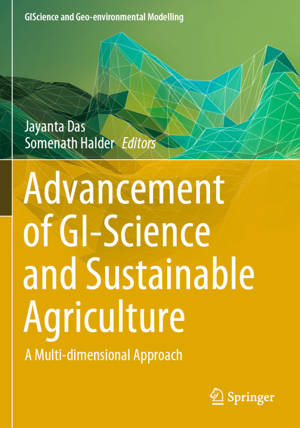
En raison d'une grêve chez bpost, votre commande pourrait être retardée. Vous avez besoin d’un livre rapidement ? Nos magasins vous accueillent à bras ouverts !
- Retrait gratuit dans votre magasin Club
- 7.000.000 titres dans notre catalogue
- Payer en toute sécurité
- Toujours un magasin près de chez vous
En raison de la grêve chez bpost, votre commande pourrait être retardée. Vous avez besoin d’un livre rapidement ? Nos magasins vous accueillent à bras ouverts !
- Retrait gratuit dans votre magasin Club
- 7.000.0000 titres dans notre catalogue
- Payer en toute sécurité
- Toujours un magasin près de chez vous
Advancement of Gi-Science and Sustainable Agriculture
A Multi-Dimensional Approach
179,45 €
+ 358 points
Description
This book describes the contributing aspects of contemporary developments related to sustainable agricultural resources and assessment of sustainable agriculture in developing nations. The issues like food crisis and declining agro-productivity, post-pandemic food security, zonation and mapping technique viewing food crisis, biotechnology and sustainable agricultural, scaling hunger indices, health hazard and food crisis, changing climate and food availability, consumer load and fertilizer usage, growing demand and increasing usage of harmful chemical in agro-fields are regarded as serious concerns. Thereafter, the scope of sustainable agricultural potentiality (SAP) modeling, amidst the arena of deforestation and encroachment of new cultivable land, impact of pandemic on sustainable agriculture, using wastewater as non-sustainable agricultural practice, applying geospatial techniques on extreme weather susceptibility and agro-production, soil erosion and poor agricultural production, questioning shifting cultivation on the issue of sustainability, meteorological drought and irrigational gaps, occupational mobility and loss of agricultural heritage, farm-excreta burning and air quality index (AQI), GI-Science and sustainable agro-management, community preparedness in food crisis management, multi-criteria hunger index (MCHI), climate change declining sustainable agro-production are worth some. Almost the entire world has recently suffered from several natural and human-induced problems, among which food crisis and unsustainable agriculture throw significant challenges to human society. Contrastingly, if modern technology and means, with advanced monitoring and calibration methodology and policy guidance, can help, it will undoubtedly reduce half of the world's problems and ensure the future survival of human society. In addition, this approach also can minimize the other partially linked problems, like climate change and food shortage, livelihood crisis, environmental refugees, international trade balance, global food supply chain interruption, the ever-expanding gap between rich and poor, and so on. Therefore, properly nurturing the knowledge on the application of GI-Science for an agriculturally sustainable society and their monitoring and management can curtail the gap between science, policy, and the ground-level scenario concerned.
Spécifications
Parties prenantes
- Editeur:
Contenu
- Nombre de pages :
- 341
- Langue:
- Anglais
- Collection :
Caractéristiques
- EAN:
- 9783031368271
- Date de parution :
- 30-09-24
- Format:
- Livre broché
- Format numérique:
- Trade paperback (VS)
- Dimensions :
- 178 mm x 254 mm
- Poids :
- 699 g

Les avis
Nous publions uniquement les avis qui respectent les conditions requises. Consultez nos conditions pour les avis.





